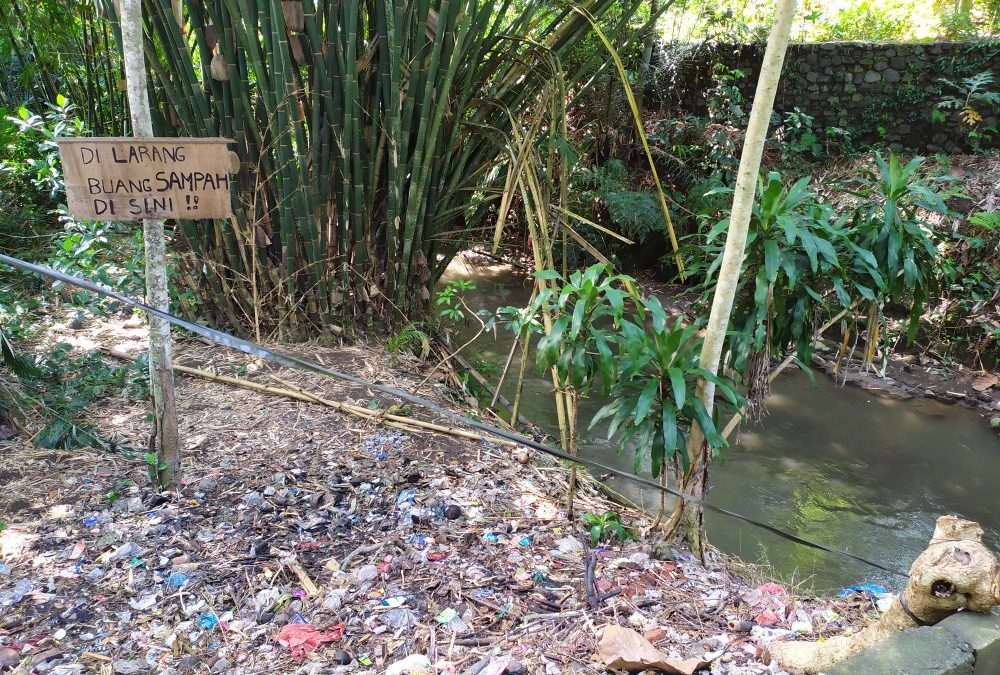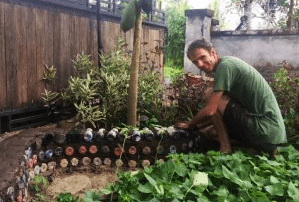I’ve always been a big believer in intentionally choosing difficult and challenging life circumstances. Be it to face personal fears or to stoke creativity in the face of challenge, this principle of existential immersion has inevitably lead to roads that are arduous, ugly and difficult– yet deeply enriching.
This is a photo of my road in Bali and the small jungle river that I pass on my walk each morning to my favorite cafe. Here in Bali, there’s really no solution for plastic, and so this is where it ends up. Bali isn’t exceptional of course– the whole world doesn’t have a solution for plastic, its just that here the reality isn’t hidden.
Whereas some people come to Bali for its famous beaches, I came for its plastic– an issue that was hitting the media five years ago as I sought to continue my regenerative innovation work. And though it hurts my heart to see it every morning, having this in my face, is what keeps me focused and has helped me stay motivated– especially through the long covid days and months.
 Its so easy to get lost in the news of the day, the passing politics and issues of the instant, to worry about careers and bills and what choices to make next. Seeing the river each morning keeps me focused. When I start to think about my generational legacy on the planet, it strikes me that there’s simply nothing more important than our personal ecological harmony. I mean, where does all our food come from? What brings us the most joy? What makes us healthy? What will ensure the joy and healthiness of our children? Our answers to all these questions fundamentally depend on living in healthy ecosystems. And how we live in our ecosystems, right now, is being watched by our children. The choices we make today will be echoed and amplified over time to the good or ill of our ecosystems… and everything else.
Its so easy to get lost in the news of the day, the passing politics and issues of the instant, to worry about careers and bills and what choices to make next. Seeing the river each morning keeps me focused. When I start to think about my generational legacy on the planet, it strikes me that there’s simply nothing more important than our personal ecological harmony. I mean, where does all our food come from? What brings us the most joy? What makes us healthy? What will ensure the joy and healthiness of our children? Our answers to all these questions fundamentally depend on living in healthy ecosystems. And how we live in our ecosystems, right now, is being watched by our children. The choices we make today will be echoed and amplified over time to the good or ill of our ecosystems… and everything else.
That said there’s one great thing about plastic. Maybe in fact, its why I’ve gravitated to it in particular as a challenge…
Unlike the crises of ocean acidification, climate change, species extinction, or glacial melting, with plastic we can actually touch it. Whereas all those other crises extend so far in time and space (hyperobjects in the words of philosopher Timothy Morton) that they fast overwhelm, the ubiquity of plastic in our moments enables us to make daily, practical choices– small choices, but one’s with existential spin.
And since plastic is something that connects across cultures and continents, it uniquely is suited for intentional, united, and mandalic collective action.
Over Covid, I’ve been pretty silent on social media and my blog here. But that’s not for a lack of thinking, reflecting, coding and writing. Afterall, each day I pass this little river and since the scorched, degrading and leaching plastic running out to the ocean. I am convinced more than ever that “the problem is the solution” (to quote Bill Molinson’s first principle of permaculture) and that plastic has great potential for ecological redemption. In fact, because through it we also touch the petroleum powered capital economy at the root of all our ecological malaise, following the road to solving plastic is the road to much more.
I’ve been mining insights and am getting excited to share the philosophy that is emerging.
Stay tuned….


